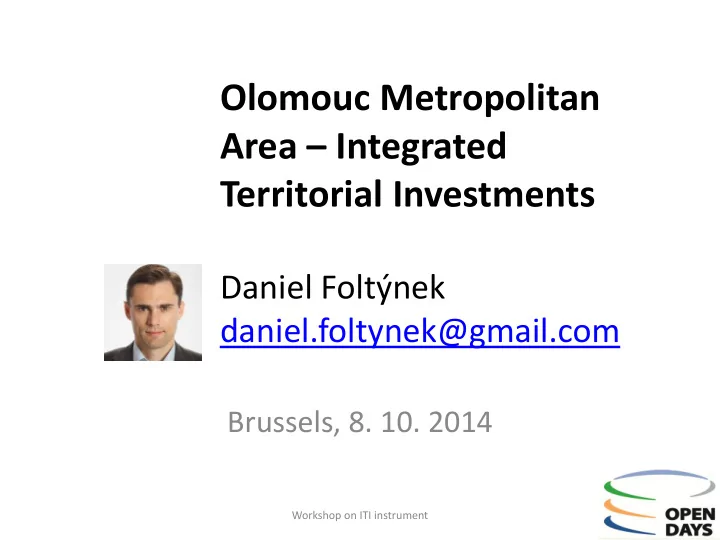

Olomouc Metropolitan Area – Integrated Territorial Investments Daniel Foltýnek daniel.foltynek@gmail.com Brussels, 8. 10. 2014 Workshop on ITI instrument
2014 – 2020: New approach to territorial development • In Czech Republic, more than 55% of GDP is created in metropolitan areas. The share of population there is 45%. That is the rationale for the ITI implementation – to enable further dynamic development of these metropolitan areas. • 7 Metropolitan areas have been selected: Prague, Brno, Ostrava, Pilsen, Ústí -Chomutov, Hradec-Pardubice and Olomouc- Prostějov - Přerov . Workshop on ITI instrument
ITIs Around Czech Republic Workshop on ITI instrument
Olomouc Metropolitan Area • This Area covers 3 core cities (Olomouc, Přerov, Prostějov) and 230 another municipalities. • Within the area live more than 437 thousand inhabitants- 190 thousand in the core cities and 247 thousand in surroundings. Workshop on ITI instrument
The most important features of the ITI • Main challenge: to solve the authentic problems and needs of the specific urban area on the one hand and to fulfil the goals of relevant operational programmes on the other hand, simultaneously. • Context: EU 2020 Strategy and support for the „Smart, sustainable and inclusive“ growth. • There is an assumption that the ITI should deliver actual results. Workshop on ITI instrument
Governance of the ITI development • The responsible body for the ITI development is City of Olomouc, Deputy Mayor (at the political level) and Head of the EU Funds Department (at the executive level) are in charge. • Ladislav Šnevajs The project is lead by formal „Steering committee“ and supported by two Working Groups. • At the national level there is a non- formal working group of the Cities. Workshop on ITI instrument
Our „Starting points“ • Because of the tight time schedule an iterative approach for the Strategy development was used. • The analytical part was conducted as rather „wide and shallow", providing an overall picture of the most important features of the area. • In parallel with the preparation of analysis there were ongoing negotiations with the managing authorities and these processes were not really coordinated. Also there were under preparation the guidelines at the national level which may affect our work. Workshop on ITI instrument
Our methodology (1) • The Analysis resulted to the SWOT Analysis and then Priority Topics, approved by the Steering Committee. • Priority topics were elaborated at the more complex graphic form of root-cause-analysis and discussed with the relevant Working Groups. • On the basis of the „Problem Tree“ was developed a design of the intervention logic. The proposed solution was then presented to the Working Groups and the Steering Committee. Workshop on ITI instrument
Our methodology (2) For the successful development of our Integrated urban strategy is the key factor a close connection and communication between all stakeholders – potential beneficiaries, Working Groups, Steering Committee and Consultants. Workshop on ITI instrument
Priority Topics of the ITI Declining Attractiveness of the Agglomeration Low Economic Performance of the Agglomeration Labour Market Failure Unsufficient Infrastructure
Root-causes Analysis
Priority Areas PA 3. Development of the Infrastructure and living environment PA 1. Promoting consistency of supply and demand in the PA 2. Creating labor market conditions for the development of the knowledge economy
Overal Intervention Logic
Intervention Logic for the PA1 FUNCTIONING A BALANCED LABOR MARKET, WHICH CREATES JOBS FOR COMPETENT AND EFFICIENT EMPLOYEES SUPPORT OF THE LABOUR A QUALITY AND AVAILABLE BUSINESS DEVELOPMENT AND MARKET BY HUMAN RESOURCES JOB CREATION THE PUBLIC SECTOR Competence of Development of Key actors in the Graduates are Adequate employees and existing labor market competent with business unemployed businesses and cooperate respect to labor infrastructure match labor creating of new effectively in the market needs (real estates) long term market needs businesses
Intervention Logic for the PA1 FUNCTIONING A BALANCED LABOR MARKET, WHICH CREATES JOBS FOR COMPETENT AND EFFICIENT EMPLOYEES SUPPORT OF THE LABOUR A QUALITY AND AVAILABLE BUSINESS DEVELOPMENT AND MARKET BY HUMAN RESOURCES JOB CREATION THE PUBLIC SECTOR Competence of Development of Key actors in the Graduates are Adequate employees and existing labor market Specific Objectives competent with business unemployed businesses and cooperate respect to labor infrastructure match labor creating of new effectively in the market needs (real estates) long term market needs businesses
Next Steps • The Specific Objectives has to be elaborated in greater detail. • A list of the potential projects is under preparation. • The Strategy has to be negotiated with respective Managing Authorities and accepted for financing. • The first draft of the ITI governance is developed and discussed with relevant partners. • On- going communication… Workshop on ITI instrument
Lessons learned • The shift from municipal „investments as usual“ (e.g. upgrade of the public property and services) to „result - based investments“ is the major challenge. • Following the methodology paid off – each step was properly introduced, discussed and approved. At the end of the process there was just a little discussion or misunderstanding. • The environment of the ESIF is not really innovative and the ITI as a brand new tool raises mistrust among key stakeholders. • The Managing authorities are not willing to delegate the role to the cities. Workshop on ITI instrument
Thanks for your attention! Daniel Foltýnek daniel.foltynek@gmail.com Workshop on ITI instrument
Recommend
More recommend